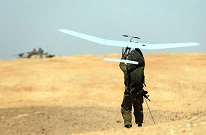From drones to missiles and armored vehicles, Israeli-made
weapons systems helped coalition forces against Taliban fighters. Though
Israeli troops have never been on the ground in the war-torn central Asian
country, numerous coalition nations used Israeli systems during the 20 years of
fighting against the radical jihadist terrorist group.
While many Israeli defense companies have stayed mum on the
use of their products in Afghanistan, according to multiple reports, countries
like the United Kingdom, Germany, Canada and Australia have used their products
for years.
Numerous countries used remotely piloted aircraft (RPAs) to
collect intelligence, and Israeli-made SPIKE missiles were used in battle.
Troops were also able to drive around safely in high-intensity areas in
Israeli-made MRAP (Mine-Resistant Ambush Protected) military light tactical
vehicles.
One of the main Israeli weapons systems used by foreign
militaries in Afghanistan was drones.
Foreign reports state that Israel is considered a leading
exporter of drones and has sold such systems to numerous countries including
Australia, Canada, Chile, Colombia, France, Germany, India, Mexico, Singapore
and South Korea.
The German Air Force began operating the Heron TP,
manufactured by Israel Aerospace Industries (IAI), in Afghanistan in 2010. They
were involved in thousands of missions, logging thousands of flight hours.
The Heron TPs are IAI’s most advanced RPAs with 40-hour
endurance, a maximum take-off weight of 11,685 pounds, and a payload of 2,204
pounds. They can be used for reconnaissance, combat and support roles, and can
carry air-to-ground missiles to take out hostile targets.
The German pilots were trained in Israel regarding how to
operate the RPA and learn about its surveillance capabilities.
The Canadian military and the Australians also flew IAI’s
Heron 1 RPA in Afghanistan.
Equipped with satellite data link and electro-optical
infrared sensors, the Heron 1 is not only able to provide reconnaissance to
ground forces in combat situations, assist in convoying and patrolling, create
movement profiles, and carry out long-term monitoring, but it is also able to
track down explosives from the air.
Several of them crashed in Afghanistan.
But it wasn’t only the Heron that was flying in
Afghanistan’s skies.
Since 2005, the Australian Army in Afghanistan has also
flown the Skylark 1 unmanned aerial vehicle (UAV) manufactured by Elbit Systems.
The Skylark, measuring seven and a half feet, is used by
troops for tactical surveillance and close-range counter-terror missions. It
can be launched by one or two soldiers, and is operated on the roof of
buildings or in the back of armored personnel carriers, providing live video to
operators once airborne.
With a range of 10-15 km, the mini-UAV has an exceptionally
quiet electric motor and outstanding observation capabilities giving troops
beyond-line-of-sight intelligence, enhancing their performance in various
mission scenarios.
Australia also flew the Skylark during missions in Iraq.
In addition to RPAs, Rafael Advanced Defense Systems’ Spike
NLOS (Non Line Of Sight) missile was used by both the British and Canadians in
Afghanistan.
The missile’s precision proved useful in battles against the
Taliban. Although the Brits tried to keep its use quiet, they publicly admitted
to using the missile, known as Exactor, in 2014.
The Spike NLOS is capable of penetrating 39 inches of armor,
and can be operated in either direct attack or mid-course navigation based on
target coordinates only. These modes enable the defeat of long-range hidden
targets with pinpoint precision, damage assessment, and the obtaining of
real-time intelligence.
It has a range of 25 km and can be used with a number of warheads
such as heat, fragmentation, PBF (penetration, blast and fragmentation) and
PBF/F suited for urban and high-intensity conflicts. The missile, which can be
installed on a variety of platforms, provides the gunner with the ability to
attack targets at stand-off range and get real-time intelligence and damage
assessment following the strikes.
Though Israel does not comment on foreign reports, Iranian
media reported in 2019 that troops were sent to Afghanistan to collect
intelligence on Iranian military movement.
According to Iran’s Tasnim news agency, Israeli
troops operated out of a United States Air Force base in Shindand in the
western Afghanistan province of Herat some 75 km from the Iranian border and
were collecting intelligence on Iranian movement around the Persian Gulf
region.
Russia’s Sputnik News stated at the time that the Israelis
were operating “under the flags of the United States and the United Arab
Emirates.”
Sputnik quoted an expert on Israel as saying that the
Israeli troops were operating under the framework of American forces stationed
there, and that the activity was carried out with the knowledge and approval of
the Afghan government.
As Western forces leave Afghanistan and the Taliban
solidifies its power over the country, the jihadist group has also obtained
advanced American weaponry, including some drones.
But with the Canadians, Brits and Germans having ended their
fight several years ago, it’s unlikely that the Taliban got their hands on the
Israeli-made systems that hunted them for so long.






















